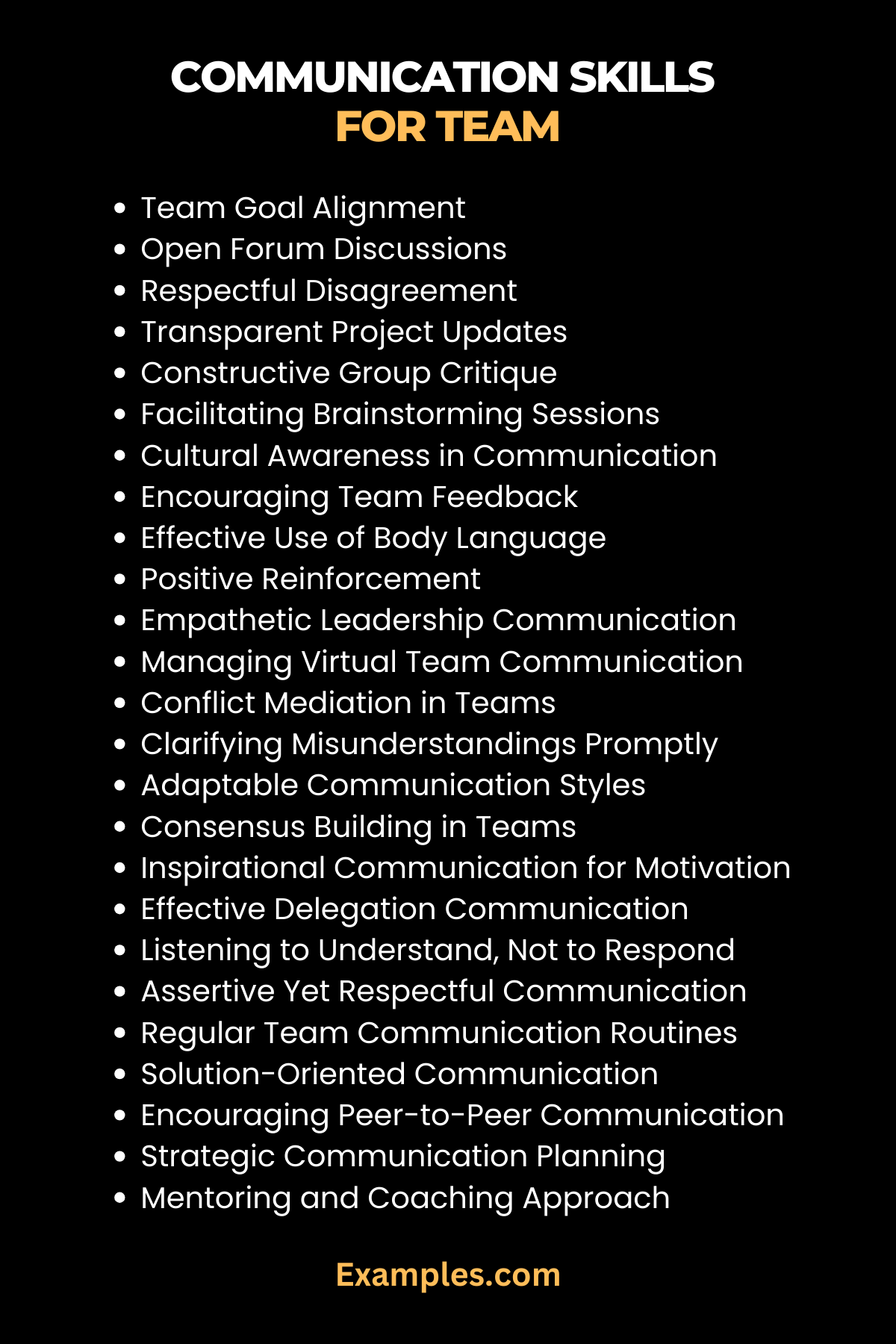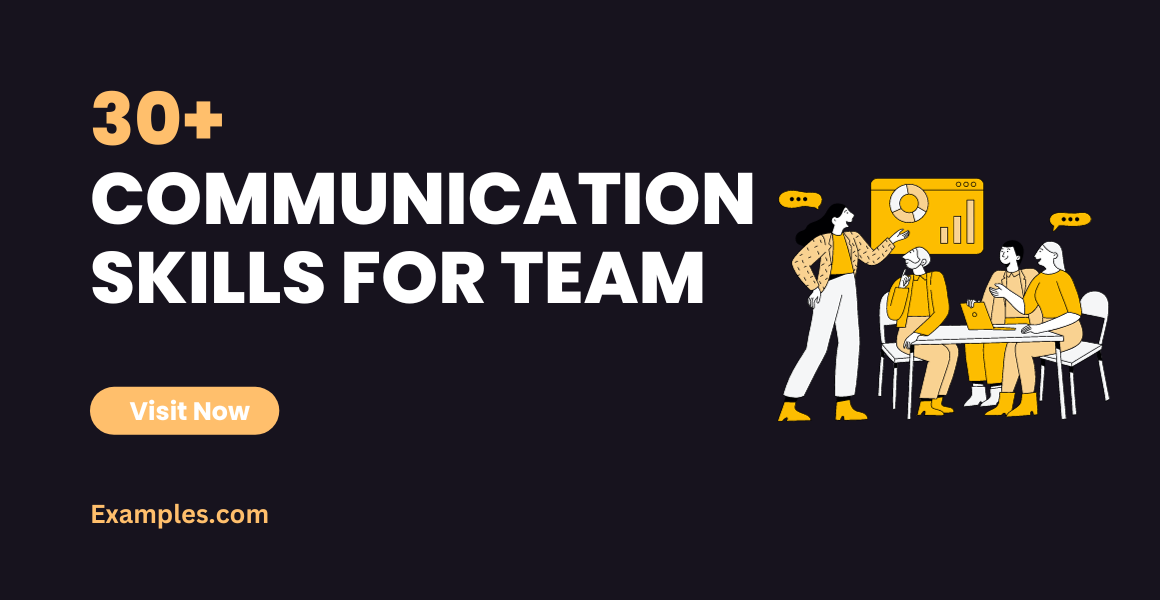Communication Skills for Team
Effective team communication is pivotal for achieving collaborative success. Mastering communication skills within a team setting ensures seamless project execution and fosters a positive work environment. Whether it’s through active listening, clear messaging, or empathetic understanding, the ability to convey and comprehend ideas is a cornerstone of team efficiency. This guide delves into the nuances of team communication, offering strategies to enhance interaction and cohesion. Embrace these insights to transform your team’s communication skill, driving both individual and collective growth.
30 Communication Skills for Team Success Examples
Effective team communication is pivotal in achieving collaborative success, particularly in fields like communication skills. Here are 30 key communication skills, each accompanied by a unique example and explanation.

- Team Goal Alignment:
Align team communication with common goals and objectives.
Example: “Let’s align our efforts to ensure we meet our project’s primary goal of increasing audience engagement.” - Open Forum Discussions:
Create open forums for sharing ideas and opinions.
Example: “I encourage everyone to openly share their ideas in our team meetings.” - Respectful Disagreement:
Encourage respectful disagreement to foster diverse perspectives.
Example: “I appreciate your viewpoint, but let’s consider alternative solutions as well.” - Transparent Project Updates:
Maintain transparency with regular project updates.
Example: “I will keep everyone updated on our project’s progress weekly.” - Constructive Group Critique:
Offer constructive critique in a group setting.
Example: “Your presentation was well-researched, but let’s work on making the data more relatable for our audience.” - Facilitating Brainstorming Sessions:
Facilitate brainstorming sessions to encourage creative problem-solving.
Example: “Let’s brainstorm potential solutions to this challenge in our next meeting.” - Cultural Awareness in Communication:
Be aware of and respect cultural differences in communication.
Example: “I understand that there may be cultural differences, so please feel free to share any concerns.” - Encouraging Team Feedback:
Actively encourage feedback from team members.
Example: “I value your feedback; it helps us improve our team dynamics.”

- Effective Use of Body Language:
Use body language effectively to reinforce messages.
Example: Using open body language and nodding to show agreement and encourage others to contribute. - Positive Reinforcement:
Use positive reinforcement to acknowledge good work.
Example: “Great job on that report, your thorough analysis really made a difference.” - Empathetic Leadership Communication:
Lead with empathy, understanding team members’ perspectives.
Example: “I understand this task is challenging; how can I support you?” - Managing Virtual Team Communication:
Effectively manage communication within virtual teams.
Example: “Let’s set a regular schedule for our virtual check-ins to keep everyone connected.” - Conflict Mediation in Teams:
Mediate conflicts to maintain a healthy team dynamic.
Example: “Let’s discuss this issue and find a solution that works for everyone involved.” - Clarifying Misunderstandings Promptly:
Address and clarify misunderstandings promptly.
Example: “There seems to be a misunderstanding; let’s clarify to ensure we’re all on the same page.” - Adaptable Communication Styles:
Adapt communication styles to suit different team members.
Example: “I understand that some prefer detailed emails, while others favor quick summaries.” - Consensus Building in Teams:
Work towards building consensus in team decisions.
Example: “Let’s find a solution that everyone can agree on.”

- Inspirational Communication for Motivation:
Communicate in a way that inspires and motivates the team.
Example: “Your hard work is driving us closer to our goals. Let’s keep up this fantastic momentum.” - Effective Delegation Communication:
Communicate effectively when delegating tasks.
Example: “I am assigning this task to you based on your expertise in this area. Let me know if you need additional resources.” - Listening to Understand, Not to Respond:
Listen to team members with the intention to understand, not just to respond.
Example: “I’m listening to understand your concerns fully. Let’s work through them together.” - Assertive Yet Respectful Communication:
Be assertive in communication while maintaining respect.
Example: “While I respect your opinion, we need to consider the project deadlines as well.” - Regular Team Communication Routines:
Establish regular routines for team communication.
Example: “Let’s have weekly team meetings to ensure everyone is updated and aligned.” - Solution-Oriented Communication:
Focus communication on finding solutions, not just discussing problems.
Example: “Instead of dwelling on the issue, let’s focus on potential solutions.” - Encouraging Peer-to-Peer Communication:
Foster an environment where peer-to-peer communication is encouraged.
Example: “I encourage you to discuss and collaborate directly with each other as well.” - Strategic Communication Planning:
Plan communication strategically for effective team coordination.
Example: “Our communication plan will involve regular updates at each project milestone.”

- Mentoring and Coaching Approach:
Use a mentoring approach to guide team members.
Example: “Let me share some of my experiences that might help you with this project phase.” - Celebrating Team Achievements Openly:
Celebrate team achievements openly to boost morale.
Example: “Congratulations to everyone on the team for achieving this milestone. Your efforts have been crucial.” - Crisis Communication in Teams:
Effectively communicate during crises to keep the team focused and calm.
Example: “Despite these unexpected challenges, we can navigate through this effectively together.” - Feedback Loop for Continuous Improvement:
Create a feedback loop for continuous team improvement.
Example: “Let’s regularly discuss what’s working well and what can be improved in our team communication.” - Encouraging Inclusivity in Discussions:
Ensure inclusivity in team discussions, allowing all voices to be heard.
Example: “I want to ensure we hear from everyone today, as all insights are valuable.” - Utilizing Technology for Efficient Communication:
Leverage technology to enhance team communication efficiency.
Example: “Let’s use this collaboration tool to streamline our communication and keep track of our discussions.”
Strategies to Build Team Communication Skills
Building strong communication skills within a team is essential, especially in the field of communication skills, where collaboration and clear information exchange are key. Here’s a guide to effective strategies for enhancing team communication skills:
Establish Open Communication Channels
- Create a Safe Environment: Foster a workplace culture where open and honest communication is encouraged and valued.
- Regular Team Meetings: Hold regular meetings to discuss progress, address issues, and share ideas, ensuring everyone has a voice.
Promote Active Listening
- Active Listening Exercises: Encourage team members to actively listen during conversations, which involves paying full attention, understanding, and responding thoughtfully.
- Feedback Sessions: Implement sessions where team members can practice giving and receiving feedback, enhancing listening and response skills.
Implement Collaborative Tools
- Use of Digital Platforms: Utilize project management and communication tools like Slack, Trello, or Microsoft Teams to facilitate easier and more organized communication.
- Training on Tools: Provide training to ensure all team members are comfortable and efficient in using these tools.

Encourage Team Building Activities
- Communication-Focused Activities: Organize team-building exercises that emphasize communication, such as group problem-solving or role-playing scenarios.
- Social Interactions: Encourage informal social interactions among team members to build rapport and ease communication barriers.
Develop a Communication Plan
- Clear Guidelines: Develop a communication plan that outlines how and when the team will communicate, including the preferred tools and platforms for different types of communication.
- Role Clarification: Clearly define communication roles within the team to ensure efficient information flow.
Offer Communication Skills Training
- Workshops and Seminars: Regularly organize communication workshops and seminars focused on enhancing various communication aspects like public speaking, writing, and interpersonal skills.
- Continuous Learning: Encourage continuous learning and improvement in communication skills through online courses, reading materials, and professional development programs.
What are Effective Communication Skills Within a Team?
Effective communication within a team is the linchpin for success in any collaborative endeavor, especially in communication skills, where the flow of information and ideas is integral. A team equipped with strong communication skills can navigate challenges more efficiently, foster a positive work environment, and drive projects to successful completion. Here’s a guide to understanding the key communication skills that are essential within a team.

Clarity and Conciseness
- Clear Instructions: Ensuring that instructions and messages are clear and concise to avoid misunderstandings.
- Focused Communication: Keeping communications focused and to the point, especially in group settings.
Respectful and Constructive Feedback
- Positive Critique: Offering constructive criticism in a way that is helpful and encouraging.
- Receptive to Feedback: Being open to receiving feedback and using it for personal and team improvement.
Adaptability in Communication Styles
- Flexibility: Adapting communication styles to suit different team members’ preferences and personalities.
- Cultural Sensitivity: Being sensitive to cultural differences in communication within diverse teams.
Emotional Intelligence
- Empathy: Demonstrating understanding and empathy in communications, considering team members’ perspectives and emotions.
- Self-awareness: Being aware of one’s own communication style and its impact on others.
Effective Use of Non-Verbal Communication
- Body Language: Using positive body language to reinforce verbal communication.
- Reading Non-Verbal Cues: Being able to interpret and respond to non-verbal signals from team members.
Strong Listening Skills
- Active Listening: Truly listening to understand, not just to respond, during conversations.
- Encouraging Dialogue: Creating an atmosphere where team members feel comfortable sharing their ideas and concerns.
Incorporating these strategies and skills can significantly improve communication within a team, leading to more effective collaboration, increased productivity, and a positive work environment. In communication skills, where teamwork is often at the core of projects, these skills are particularly invaluable.
What Communication Skills Do You Bring to Teamwork?
Bringing effective communication skills to teamwork is crucial, particularly in communication skills, where collaborative projects are the norm. Understanding and applying these skills can significantly enhance team dynamics and project outcomes.
Active Listening and Empathy
- Understanding Team Needs: Active listening helps in understanding and addressing team members’ needs, concerns, and ideas.
- Building Trust: Empathy in communication fosters trust and stronger relationships within the team.
Clear and Assertive Communication
- Direct and Clear Messages: Conveying messages clearly and directly avoids misunderstandings and ensures that everyone is on the same page.
- Balancing Assertiveness: Assertive communication helps in expressing your ideas confidently while respecting others’ opinions.
Adaptability and Flexibility
- Adjusting Communication Styles: Adapting your communication style to suit different team members enhances mutual understanding and cooperation.
- Cultural Sensitivity: Being culturally sensitive in your communication approach, especially in diverse teams, helps in building an inclusive environment.
Problem-Solving and Conflict Resolution
- Effective Dispute Management: Using communication to effectively navigate and resolve conflicts within the team.
- Creative Solutions: Communicating different perspectives and ideas to contribute to creative problem-solving.
How Can Communication Skills Help a Team?
Effective communication skills are the backbone of successful team operations. Here’s how they contribute to team efficiency and success:
Enhances Team Collaboration
- Facilitates Cooperation: Good communication facilitates cooperation and smooth collaboration among team members.
- Aligns Team Goals: Effective communication ensures that all team members are aligned with the team’s objectives and strategies.
Improves Decision-Making
- Informed Decisions: Clear communication allows the team to make informed decisions by ensuring all relevant information is shared and understood.
- Increases Participation: Encourages all team members to participate in decision-making, leading to more well-rounded and inclusive decisions.
Boosts Team Morale and Engagement
- Positive Work Environment: Open and respectful communication contributes to a positive work environment, boosting team morale.
- Enhances Engagement: Teams with good communication are more engaged, leading to higher productivity and job satisfaction.
How to Improve Communication Skills for Team
Improving communication skills within a team is essential for achieving collaborative success, especially in sectors like communication skills. Here’s a detailed guide on enhancing team communication skills:
Encourage Open and Honest Dialogue
- Foster an Open Communication Environment: Create a team culture where open and honest dialogue is encouraged. This can be done through regular team meetings and open forums where team members feel safe to voice their opinions and ideas.
- Lead by Example: Team leaders should model the type of communication they want to see within the team. This includes being transparent, approachable, and responsive.
Active Listening
- Practice Active Listening: Encourage team members to practice active listening. This means fully concentrating on the speaker, understanding their message, responding thoughtfully, and then remembering what is said.
- Listening Workshops: Conduct workshops or training sessions to develop active listening skills among team members.
Effective Use of Communication Tools
- Leverage Digital Platforms: Utilize digital communication tools effectively for different purposes – Slack or Teams for quick discussions, emails for formal communication, and video conferencing for more personal interaction.
- Training in Digital Communication: Offer training to ensure all team members are adept at using various digital platforms and understand digital communication etiquette.
Develop Feedback Mechanisms
- Regular Feedback Sessions: Implement regular feedback sessions where team members can constructively critique each other’s work and communication styles.
- Anonymous Feedback Options: Provide options for anonymous feedback to ensure that team members can share their thoughts freely, especially on sensitive matters.
Tailor Communication to the Audience
- Understand Team Dynamics: Recognize that each team member may have a preferred communication style. Tailor your communication to be effective with different personalities and roles within the team.
- Personalized Communication Training: Offer training that helps team members understand different communication styles and how to adapt their approach accordingly.
Build Emotional Intelligence
- Empathy Training: Conduct training sessions focused on building empathy, which is crucial for understanding and effectively communicating with others.
- Emotional Intelligence Workshops: Organize workshops to enhance emotional intelligence, enabling team members to better understand and manage their own emotions as well as those of their colleagues.
Non-Verbal Communication Skills
- Understand Non-Verbal Cues: Educate team members on the importance of non-verbal cues such as body language, facial expressions, and tone of voice.
- Role-Playing Exercises: Use role-playing exercises to practice reading and using non-verbal communication effectively.
Encourage Inclusivity in Communication
- Inclusive Communication Practices: Ensure that communication within the team is inclusive, giving space to all members to express their thoughts and opinions.
- Diversity Training: Implement diversity training to make team members aware of cultural differences and how these might impact communication.
Conflict Resolution Skills
- Develop Conflict Resolution Techniques: Equip team members with the skills to handle and resolve conflicts in a constructive manner.
- Mediation Training: Offer mediation training to help team leaders and members navigate through disagreements and find mutually acceptable solutions.
In the field of communication skills, where teamwork and collaboration are paramount, these strategies can significantly improve the way team members interact and communicate. By developing these skills, teams can work more effectively, foster a positive work environment, and achieve their collective goals.
Enhancing communication skills within a team is pivotal for fostering a collaborative and productive work environment, especially in communication skills. By implementing strategies like fostering open dialogue, practicing active listening, and developing empathy, teams can significantly improve their interactions. These skills lead to better understanding, effective problem-solving, and ultimately, the successful achievement of team goals and projects.



